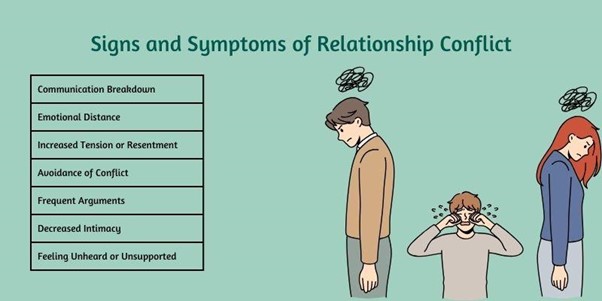When Arguments Turn Silent: The Power of Emotional Distance
When Arguments Turn Silent: The Power of Emotional Distance

When relationships turn quiet, many people mistake silence for peace. But when arguments transform into emotional distance, something far more dangerous begins—the slow unraveling of intimacy. Understanding the power of emotional distance can be the key to saving relationships before they reach a breaking point.
Understanding Emotional Distance in Relationships
Emotional distance doesn't announce itself with dramatic exits or heated confrontations. Instead, it creeps in quietly—through unanswered texts, conversations that never go deeper than surface level, and nights spent back-to-back in the same bed feeling like strangers. This silent withdrawal creates a gap that, left unchecked, becomes harder to bridge than any argument.

Unlike loud arguments that clear the air, emotional distance builds invisible walls. Research shows that couples who withdraw emotionally experience higher rates of relationship dissolution than those who engage in healthy conflict. The silence may feel safer in the moment, but it creates resentment, overthinking, and profound loneliness within the partnership.
Why Silence Can Be More Destructive Than Fighting
Arguments, while uncomfortable, demonstrate that both partners still care enough to engage. When arguments turn silent, however, it signals something more troubling—emotional disconnection. This withdrawal often stems from several root causes:
Unresolved Conflict Accumulation
Many couples avoid confrontation, believing they're maintaining peace. But swept-under-the-rug issues don't disappear—they accumulate. Each unaddressed concern adds another layer to the emotional wall separating partners. What starts as minor annoyances transforms into major resentments that poison the relationship from within.
Fear of Vulnerability
For individuals who grew up in environments where emotions were unsafe or dismissed, vulnerability feels like danger. They withdraw rather than risk rejection or conflict. This protective mechanism, while understandable, prevents the deep connection relationships need to thrive.

The Myth of "We Never Fight"
Couples who proudly claim "we never fight" may actually be displaying a red flag. Healthy relationships require occasional disagreement—it shows both partners feel safe expressing different viewpoints. Complete absence of conflict often indicates emotional suppression rather than relationship harmony.
The Hidden Dangers of Emotional Withdrawal
When emotional distance replaces connection, several destructive patterns emerge:
- Communication Breakdown: Conversations become transactional rather than meaningful, limited to logistics and surface-level topics
- Physical Intimacy Decline: Emotional disconnection inevitably affects physical closeness, as true intimacy requires emotional safety
- Parallel Lives: Partners begin functioning as roommates rather than romantic partners, pursuing separate interests without shared experiences
- Assumption and Misinterpretation: Without open dialogue, partners fill gaps with assumptions, often interpreting silence negatively
- Resentment Building: Unexpressed needs and unmet expectations create bitterness that erodes goodwill and affection
Breaking the Silence: Reconnecting After Emotional Distance
The good news? Emotional distance can be reversed with intentional effort from both partners. Here are proven strategies to rebuild connection:

1. Initiate the Difficult Conversation
Someone must be brave enough to break the silence. Approach your partner gently: "I feel like we've been drifting apart. Do you feel it too?" This opens dialogue without blame, creating space for honest discussion about the relationship's current state.
2. Practice Active Listening Without Defending
When your partner speaks, resist the urge to interrupt or defend yourself. Breathe deeply and truly hear their perspective. Understanding doesn't require agreement—it requires respect. Allow each person to finish their thoughts completely before responding.
3. Accept Your Partner's Reality
Even if their perception seems inaccurate or unfair, recognize that their feelings represent their lived experience. Dismissing their reality only deepens the divide. Validation—not necessarily agreement—helps partners feel heard and valued.
4. Schedule Regular Check-Ins
Make relationship maintenance intentional. Weekly check-ins where both partners share feelings, concerns, and appreciations prevent small issues from becoming relationship-threatening problems. These conversations don't need to be long—15 focused minutes can work wonders.
5. Reintroduce Physical Touch
Small gestures matter enormously. A hand on the shoulder, a genuine hug, holding hands during a walk—these physical connections signal "I'm here" and "we matter" more powerfully than words sometimes can.
When Professional Help Becomes Necessary
Sometimes emotional distance runs too deep for couples to navigate alone. Seeking couples therapy isn't admitting failure—it's demonstrating commitment to the relationship. A trained therapist provides tools for healthy communication, helps identify destructive patterns, and creates safe space for difficult conversations.
Consider professional support if you recognize these warning signs:
- Weeks or months pass without meaningful conversation
- One or both partners have checked out emotionally
- Attempts at reconnection consistently fail or trigger more conflict
- Resentment has hardened into contempt
- You're staying together "for the kids" or other external reasons rather than genuine connection

The Choice Between Distance and Connection
Every relationship faces crossroads where partners must choose: continue drifting apart or do the uncomfortable work of reconnecting. Emotional distance offers the illusion of safety—no vulnerability means no risk of rejection. But it also guarantees no genuine intimacy, no deep understanding, and ultimately, no fulfilling relationship.
Arguments, when handled constructively, actually strengthen relationships by demonstrating that conflict doesn't equal catastrophe. Partners who navigate disagreements successfully build trust that their bond can withstand stress. In contrast, silence creates fear that any disruption will shatter the fragile peace.
Moving Forward: From Silence to Strength
Transforming emotional distance into renewed connection requires patience, vulnerability, and consistent effort. Progress won't happen overnight—relationships that took months or years to drift apart need time to heal. But every small step toward openness, every difficult conversation navigated successfully, every moment of choosing connection over withdrawal, rebuilds the bridge between partners.
The alternative—allowing silence to continue its destructive work—leads inevitably to relationships that end not with explosive finales but with quiet dissolution. Don't let your relationship become a statistic of love lost to emotional distance. Break the silence today.
Take Action Now
If this article resonated with you, don't keep it to yourself. Share it with someone who needs to hear that emotional distance can be overcome. Your relationship deserves the effort, and reconnection is possible when both partners commit to breaking the silence.
Frequently Asked Questions
Is it normal for couples to go through periods of emotional distance?
Brief periods of emotional distance during stressful life events (career changes, family illness, new parenthood) are normal. However, if emotional withdrawal becomes the default pattern lasting months or causing significant relationship strain, it signals a problem requiring attention.
How is emotional distance different from needing space after an argument?
Needing temporary space to calm emotions and process thoughts is healthy—it's communicated clearly with a timeframe for reconnection. Emotional distance involves prolonged withdrawal without communication, often used to punish or avoid resolving conflict entirely.
Can a relationship recover from severe emotional distance?
Yes, relationships can recover if both partners commit to the work. Recovery requires honest communication, often professional guidance, patience with the process, and willingness to be vulnerable. However, both people must actively participate—one person alone cannot bridge the gap.
What if my partner refuses to discuss our emotional distance?
If your partner consistently refuses to engage in conversation about relationship concerns, this itself indicates a serious problem. Consider writing a heartfelt letter expressing your feelings without blame, suggesting couples therapy as a neutral space for dialogue, or evaluating whether the relationship meets your fundamental needs.
How long should I wait before seeking couples therapy?
Don't wait until the relationship reaches crisis point. If you've attempted reconnection multiple times without success, or emotional distance persists beyond a few weeks despite efforts to address it, seeking professional help early increases the likelihood of successful relationship repair.